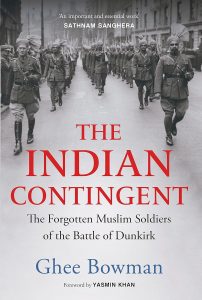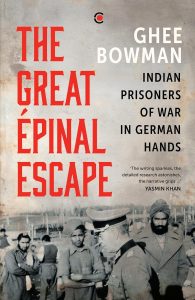 I am not the most qualified person to write a tribute for the recently deceased Dr Ghee Bowman (1961 – 10 May 2025). I never had the honour of meeting him, and our acquaintance was limited to a few correspondences about Muslim soldiers in the Second World War. I cannot speak to his private life, though from what I have heard from colleagues who knew him, he is remembered as a person of charm, kindness, elegance, and immense generosity. Among younger scholars in particular – this I can confirm – he left a lasting impression through his openness in sharing knowledge, sources, and thoughtful guidance. He supported others with an unselfish, almost altruistic spirit that left many of us both inspired and encouraged. I sincerely hope that those who knew him more closely will come forward and share fuller reflections. My heartfelt condolences go to his family, friends, loved ones, and to the research community, for whom his loss leaves a profound and lasting void.
I am not the most qualified person to write a tribute for the recently deceased Dr Ghee Bowman (1961 – 10 May 2025). I never had the honour of meeting him, and our acquaintance was limited to a few correspondences about Muslim soldiers in the Second World War. I cannot speak to his private life, though from what I have heard from colleagues who knew him, he is remembered as a person of charm, kindness, elegance, and immense generosity. Among younger scholars in particular – this I can confirm – he left a lasting impression through his openness in sharing knowledge, sources, and thoughtful guidance. He supported others with an unselfish, almost altruistic spirit that left many of us both inspired and encouraged. I sincerely hope that those who knew him more closely will come forward and share fuller reflections. My heartfelt condolences go to his family, friends, loved ones, and to the research community, for whom his loss leaves a profound and lasting void.
While I cannot speak in depth about his personal life, I can speak to the immense value and inspiration his work has offered me as a doctoral student researching Britain and Islam in the Second World War. Dr Bowman was one of the very few scholars to engage seriously with the strangely understudied field of Muslim contributions to the Allied war effort. I remain deeply indebted to his magisterial scholarship, which has provided not only a foundation and guide for my own research but also a model – and a remarkably high standard – of how to approach the complex and layered roles of Islam and Muslims in Britain’s wartime history.

His first book, The Indian Contingent: The Forgotten Muslim Soldiers of Dunkirk published in 2020, just a year after completing his PhD at the University of Exeter in 2019, is a work of serious and outstanding scholarship. Based on his doctoral research conducted in dozens of archives and collections across five countries –including official records and museum, library, private and family collections – it also draws on an impressive 31 oral history interviews that he conducted himself, in addition to many more gathered by others. For this project, he travelled extensively to India, Pakistan, France, Germany, and across the United Kingdom, consulting not only well-known national archives but also unofficial family and community records which allow for a more fully developed and intimate story. With a laser-sharp eye for detail, a profound sense of care, and deep commitment, Ghee Bowman’s book – and indeed his scholarly legacy as a whole – can be safely described in the words of historian Yasmin Khan as “a labour of love.”[1]
One cannot help but be left in wonder at Ghee Bowman’s remarkable achievements in the field of history, all accomplished within a strikingly short period. A graduate of Drama in 1983, he spent much of his professional life outside academic history before returning to study, completing a master’s degree in history in 2015 and earning his PhD from the University of Exeter in 2019. Yet in just a few years, he achieved what many do not over the course of an entire academic career. When Ghee came to history, he brought with him a wealth of life experience, an extraordinary eye for detail, and a profound compassion that shines through on every page of his work. Yasmin Khan, Professor of History at the University of Oxford, expressed her admiration for his seminal research, writing:
“On the trail of the Indian Contingent, Ghee Bowman has travelled thousands of miles across Britain, Europe, India and Pakistan. He has tracked down lost family archives and photographs from private albums, and conducted interviews with the descendants of soldiers who thought their family histories had been rendered irrelevant to the greater story of Britain’s involvement in the Second World War. He has also written a riveting and moving account of these men’s lives, which has enabled him to get much closer than any previous writer to understanding the Indian soldier’s experience in Europe in the 1940s. Apart from the character Kip in Michael Ondaatje’s novel The English Patient, and a handful of historical studies which have simply acknowledged the presence of Indians in Europe, there has been very little integration of this experience into the story of the British Home Front in the Second World War, fictional or otherwise. This book changes all that and is therefore, in short, groundbreaking.”[2]
As she continued to emphasise:
“Turning up in Pakistan to do historical research requires serious commitment and patience. There was no ready store of neat archives waiting for Ghee; he had to dig around in many places and speak to hundreds of people, carefully listening to what they wanted and needed to say, and he has pieced all this together into this colourful jigsaw.”[3]
Ghee took history seriously and immersed himself in Urdu – and to some extent, Arabic – in order to work more effectively with primary sources. At the same time, he approached his research with deep humility. In the acknowledgement of his first book he writes: “I stand on the shoulders of giants.” He was never too proud to openly acknowledge the limitations of his own position: “I am a white British man writing a story about South Asians, which throws open many possibilities of cultural misunderstandings and errors.” Yet he did not use this as an excuse to avoid engaging with histories beyond Europe, as so many do. Instead, he actively sought advice and guidance from colleagues, librarians, archivists, researchers, and the friends and family members of the heroes in his story. For him, writing this book was not merely a dissertation or a career step – it was a way to make voices heard. And for those voices he was not able to include, he expressed heartfelt regret: “I appreciate that I haven’t included all the great stories that I heard during my research. If I’ve missed yours out, apologies. If I haven’t heard it yet, please get in touch.”[4]

Following his first book, Ghee published a second original work in 2024, titled The Great Épinal Escape: Indian Prisoners of War in German Hands – a story that had remained entirely unknown. As he wrote: “The story of the escapes, and the support given in France, is completely unknown. No film has been made, no book written, no article exists on the internet or in an academic journal.”[5] He went on to contextualise the story of the 278 Indian Army escapees within the broader history of around 15,000 Indian prisoners of war held in German captivity during the Second World War. Once again, he travelled widely, conducted over 25 new oral history interviews, and unearthed stories long thought to be lost – piecing together a narrative that, as many have said, is worthy of being adapted into novels and films.
After completing his second book, Ghee had no intention of resting. He was already working on his next project about the British Indian army. His work was not only interesting – it was deeply important. It mattered not just because it filled a gap in historical research, but because it spoke to people’s sense of identity and belonging. Many South Asians felt that he was telling a history that helped them understand their own past, while many Britons and Europeans began to think more broadly and critically about theirs. As Yasmin Khan aptly put it: “These seem to me to be exactly the sort of stories that Britain needs, that people want to know, and that give us a chance to move forward in the twenty-first century.”[6] His compassion for the subject also found expression in his frequent appearances on podcasts and media channels, where he advocated not only for recognition of these stories but also for the erection of war memorials in honour of these forgotten soldiers.
As we commemorate the 80th anniversary of the end of the Second World War, it is humbling to recognise how much research still remains to be done. Ghee Bowman’s work reminds us not only of the vastness of untold histories but also of the responsibility historians carry to recover the voices that have been overlooked. His research stands as a testament to what is possible when historical scholarship is guided by empathy, rigour, and a commitment to inclusion.
As I continue my own research on Britain and Islam during the Second World War, Ghee Bowman’s work remains a vital point of reference – one I return to frequently. It is not only a rich source of material but also a benchmark of quality, range, and integrity to which any serious student or scholar in this field must pay deep respect. Although Bowman came to historical scholarship relatively late, he achieved in a very short time what many spend careers striving for: original, rigorous, and trailblazing work. Any future research on Islam or India in the Second World War will have to reckon seriously with his contributions.
The academic community – and indeed, British society – has lost an important and generous voice. His passing will also be deeply felt by many in the Muslim and South Asian communities, for whom his work represented a long-overdue recognition of their families’ histories and sacrifices. Yet Ghee was always deeply committed to supporting and uplifting others, especially emerging scholars. One can only hope that those he inspired will carry forward his legacy with the same spirit of curiosity, humility, and care.
Omar T. Nasr
Edinburgh, 13 May 2025
[1] Ghee Bowman, The Indian Contingent: The Forgotten Muslim Soldiers of Dunkirk (Cheltenham: The History Press, 2020), foreword.
[2] Bowman, foreword.
[3] Bowman, foreword.
[4] Bowman, acknowledgements.
[5] Ghee Bowman, The Great Épinal Escape: Indian Prisoners of War in German Hands (Gloucestershire: The History Press, 2024), preface.
[6] Bowman, The Indian Contingent, foreword.